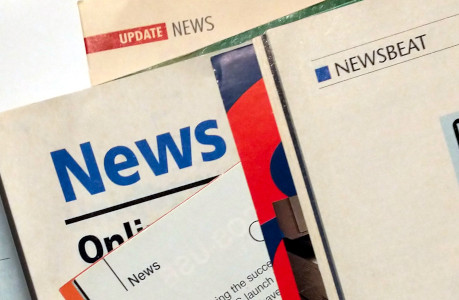QuadDioph is a new piece of software from Martin Carradus. It’s an application that solves or finds “solution of certain Quadratic Diophantine Equations, of the form x^2 + B.x.y + A.y^2 = z^p, (e.g. x^2 + y^2 = z^2, two squares adding to a square, or x^2 + y^2 = z^3, two squares adding to a cube).” The application is free to download from Martin’s website.
Martin Wuerthner has announced that an ARMv7 compatible version of InterGif. Version 6.18 can be used on the BeagleBoard, ARMini, etc. InterGif is an application for converting graphics from RISC OS Sprite and Draw formats to GIF format with optimised palettes, allowing them to be viewed on other platforms, and used on websites. Originally written by Peter Harley and now maintained by Martin Wuerthner, the software also allows GIF animations to be created from a series of Sprites, and can also convert from GIF to Sprite format.
Chris Evans of TARDIS CJE Micros fame has announced that PhotoDesk 3.10 has been updated to fix a problem reported when using it on the BeagleBoard/ARMini when carrying out copy operations on a canvas. Chris stresses that this update is only suitable for PhotoDesk 3.10, and that although it can be applied on any computer, only BeagleBoard/ARMini users will benefit.
Version 1.04 of SchemEd, the freeware electronic circuit editor from Howard Dawson Audio, is now available, along with version 1.03 of BSpice3f5. Howard explains that all the primitive Spice devices from ‘B’ thru’ ‘Z’ are now supported by the circuit editor, along with various other miscellaneous fixes, and that communication between SchemEd and BSpice is now much more robust, with the introduction of a simple handshaking system.
RISC OS Open Ltd have announced the availability of version 22 of their Desktop Development Environment tools. This sees the completion of the ARMv7 support work in ObjAsm and DecAOF that was started with the previous interim release, and there have been many other changes since the last version that was formally announced. Additionally, the way sales and upgrades of the DDE are handled is changing, and prices are being lowered, with the basic price to a new customer being £40.
There are two pieces of news from R-Comp, with the first being the release of version 6.03 of Messenger Pro, which has already been sent out to users. According to Andrew Rawnsley, the new version provides better compatibility with all RISC OS machines, and makes it much simpler to switch users “on the fly”, thanks to new toolbar buttons. Printing has also been tweaked. Andrew asks that if you’re an existing user who hasn’t received the update for whatever reason, please contact R-Comp to receive the update, which is free to anyone owning v6.
R-Comp’s second piece of news is that an operating system upgrade for ARMini users has been released to existing users. The update has been made as simple as possible, with a friendly desktop application that explains the process and lists the changes and new features, and an “Update now” button to actually install the new version of RISC OS, keeping things as simple and painless as possible for users. Once installed, there’s also an easy to use procedure “roll back” to older versions should the need arise. Features of this new version of the operating system include a smoother desktop experience, with particular improvements to dragging windows, etc, enhanced USB device support, improved handling of removable storage devices on the front USB ports, better performance from the built-in card reader also performs better, and the new “filer action” window recently discussed on the RISC OS Open Ltd forum, with a percentage completed bar during copy/delete operations. The update also resolves some minor issues with some of David Pilling’s applications.
Most RISC OS users will probably be aware of Xara, who were once known as Computer Concepts and developed software like Impression and ArtWorks, amongst other things, for RISC OS computers. Well, 2011 marks their 30th anniversary, and as well as marking the anniversary with various celebratory offers, they’ve also added a page to their website outlining their history, including a product timeline – starting with “several small utilities for the Acorn Atom” in 1981.
Finally, the recently started RISC OS Blog has now added a forum for readers to discuss news and other matters of interest.



I’m curious about the ARMini’s OS update and “roll back” procedure. Is it a softload on top of the OS stored on the SD card?
Unfortunately, despite being an ARMini owner, I have no idea – neither that computer nor my Iyonix is set up at the moment, and might not be for another few weeks.
And, gah! I’ve just realised that after writing this snippets post, I deleted the email Andrew sent to users with the login details for the site – looking now, it’s already expired from my junk folder. How stupid of me! 🙁
I’ll have to email Andrew, but I’ll wait until the computer is actually set up.